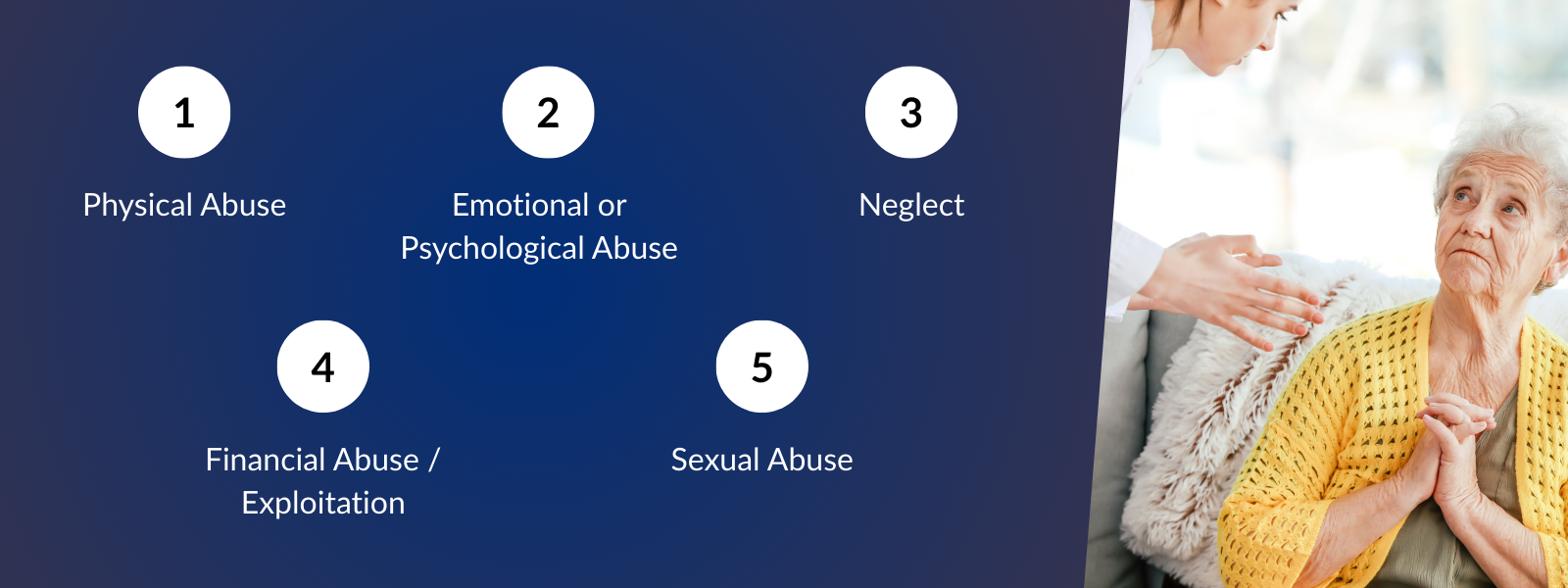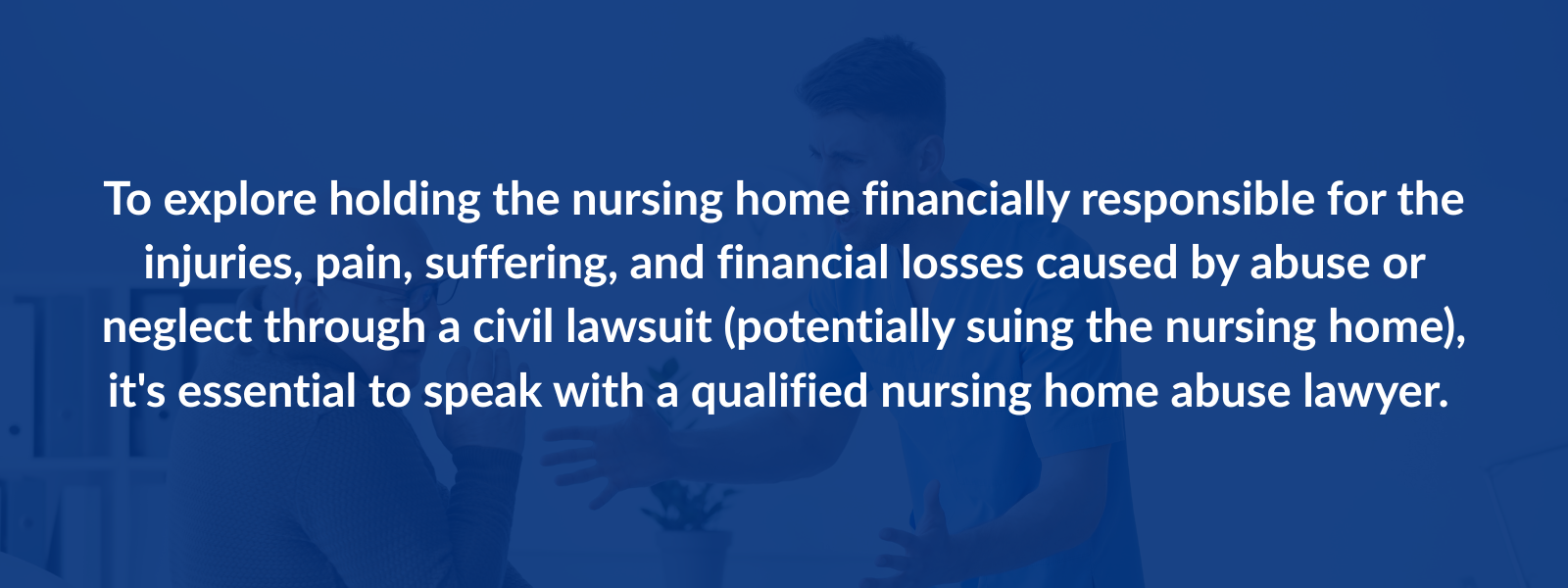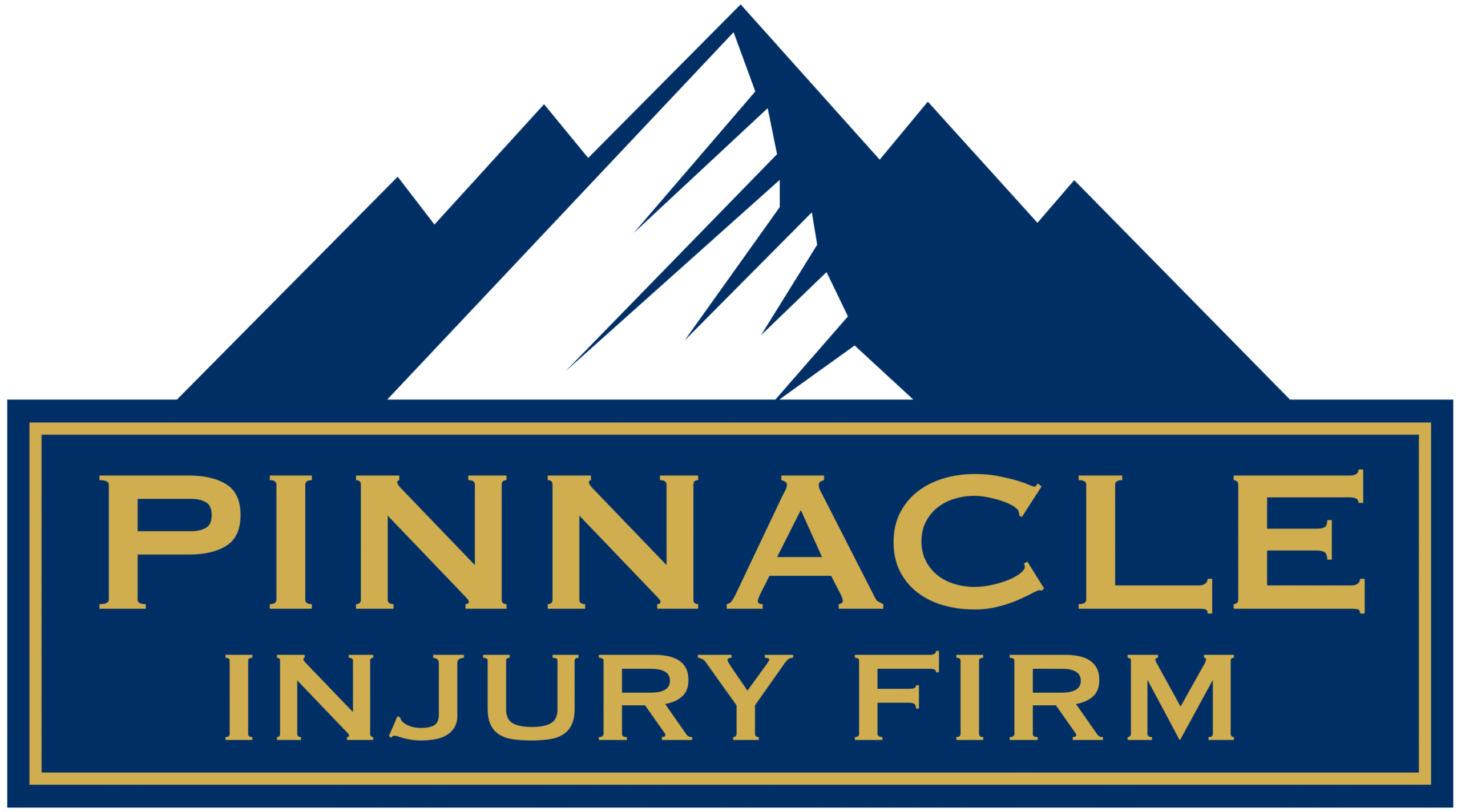Nursing Home Abuse Law Firm Protecting Vulnerable Seniors
Compassionate Representation for Victims of Neglect & Abuse.
Suspecting mistreatment or neglect of your loved one in a care facility is incredibly distressing and often overwhelming. Our nursing home abuse law firm helps families demand accountability, and you pay absolutely nothing unless we recover compensation for your family’s suffering.
Pay Absolutely Nothing Unless We Win
Work with us risk-free – you pay zero upfront costs and owe no attorney fees unless we win your nursing home abuse claim.
Aggressive Advocacy Against Nursing Home Facilities
Our nursing home neglect law firm fights relentlessly against nursing home facilities to get justice and achieve the maximum fair compensation you deserve.
Your Loved One's Well-being Comes First
Your family's recovery is our priority; we handle the complex legal details so you can focus solely on healing.
Harmed by a preventable CO leak? Let us help you.
Identifying Signs of Nursing Home Abuse & Neglect
Abuse and neglect in nursing homes aren’t always obvious, and sometimes concerns might be dismissed as normal signs of aging. However, you know your loved one best. Trust your instincts if something doesn’t feel right, and pay close attention during visits.
Knowing these common signs of nursing home abuse and signs of nursing home neglect can empower you to ask questions and protect their well-being:
Signs of Physical Abuse
- Unexplained bruises (especially matching shapes, on upper arms, or around wrists/ankles), welts, cuts, burns, or scars.
- Frequent falls or injuries are repeatedly blamed on the resident’s ‘clumsiness’.
- Evidence of restraints being used, such as marks on wrists or ankles.
- Broken eyeglasses, damaged hearing aids, or other broken personal items.
- Sudden development of fear, agitation, or withdrawal, especially around specific staff members.
Signs of Emotional or Psychological Abuse
- Unusual behaviors like mumbling, rocking, sucking, or biting.
- Appearing fearful, anxious, agitated, withdrawn, or non-communicative.
- Sudden changes in personality, increased depression, or loss of interest in activities.
- Hesitancy to speak openly or being fearful when certain staff are nearby.
- Being isolated from social interaction or family visits without a valid reason.
Signs of Neglect (Including Bedsores & Fall Risks)
- Development or worsening of bedsores (pressure ulcers), especially without proper treatment documented.
- Poor personal hygiene, strong body odor, unchanged/soiled clothes or bedding.
- Signs of dehydration or malnutrition, such as unexplained weight loss or dry skin/mouth.
- Unsanitary living conditions, like dirty rooms, soiled linens, or pest infestations.
- Medical needs seemingly ignored – untreated infections, medication errors, lack of needed assistance.
- Repeated falls may indicate inadequate supervision, failure to implement fall precautions, or unmet needs.
Signs of Financial Abuse / Exploitation
- Sudden, unexplained changes in bank accounts, property titles, wills, or powers of attorney.
- Missing cash, checks, credit cards, or personal belongings from the resident’s room.
- Bills going unpaid or notices for insufficient funds are being sent despite adequate income.
- New “best friends” or staff members showing excessive interest in the resident’s finances.
- Charges for services, supplies, or medications that weren’t actually provided or needed.
Signs of Sexual Abuse
- Unexplained bruising around breasts or genital areas; vaginal or anal bleeding.
- Torn, stained, or bloody underclothing.
- Difficulty walking or sitting comfortably without a clear medical cause.
- Sudden onset of STDs or genital infections.
- Increased agitation, withdrawal, depression, or fearful reactions, especially towards specific people.
If you observe any of these warning signs, take them seriously. Document what you see, ask direct questions of the staff and administration, and don’t hesitate to seek external help. Consulting a nursing home abuse lawyer can clarify your options for protecting your loved one.

Know Your Loved One's Nursing Home Resident Rights & Facility Obligations
It’s vital to know that residents living in nursing homes certified by Medicare or Medicaid are protected by fundamental rights established under federal law (often referred to as the Nursing Home Reform Law or OBRA ’87).
Understanding these nursing home resident rights helps you advocate for your loved one. Equally important are the legal duties and responsibilities these facilities must uphold to provide safe, quality care.
Your Loved One's Key Rights Include
- Dignity and Respect: The right to be treated with consideration, respect, and dignity at all times.
- Freedom from Abuse, Neglect & Restraints: A fundamental right to live in a safe environment, free from verbal, mental, sexual, or physical abuse, involuntary seclusion, and improper physical or chemical restraints.
- Appropriate Care: The right to receive adequate and appropriate medical, personal, and nursing care tailored to their individual needs, assessment and care plan.
- Participation & Information: The right to be fully informed about their own health condition and treatments, and to participate in developing their care plan.
- Make Complaints: The right to voice concerns or grievances to staff or outside agencies (like the Ombudsman) without fear of punishment or retaliation.
- Privacy: The right to privacy regarding their personal space, medical care, and communications.
- Independent Choices: The right to make choices about aspects of their life, such as schedule, activities, and physician (where feasible), promoting autonomy.
Key Nursing Facility Duties Include
- Sufficient & Qualified Staffing: Providing enough licensed nurses (RNs, LPNs/LVNs) and certified nurse aides (CNAs) with the appropriate skills, 24/7, to properly meet all residents’ care needs according to their assessments.
- Comprehensive Assessment & Care Planning: Thoroughly assessing each resident’s needs and developing an individualized care plan designed to maintain their highest practicable physical, mental, and psychosocial well-being.
- Preventing Accidents & Ensuring Safety: Implementing policies and providing adequate supervision to maintain a safe environment and prevent avoidable accidents, such as falls.
When nursing homes fail to respect these fundamental rights or fulfill their critical duties, often due to issues like chronic understaffing, inadequate training, or cutting corners, preventable harm like neglect and abuse can occur.
If you suspect such failures led to injury or suffering for your loved one, contact our nursing home neglect law firm. We understand how to investigate these violations and hold negligent facilities accountable.
Types of Nursing Home Abuse & Neglect Cases We Handle
Mistreatment of vulnerable residents in care facilities can unfortunately take many forms, ranging from deliberate acts of harm to failures caused by systemic carelessness. Our nursing home abuse lawyer has experience investigating and pursuing justice for various types of abuse and neglect, including:
- Physical Abuse: The intentional use of physical force resulting in bodily injury, pain, or impairment. Examples include hitting, pushing, shaking, improper use of physical restraints, or force-feeding.
- Emotional or Psychological Abuse: Inflicting mental pain, anguish, or distress through verbal or non-verbal acts like yelling, insulting, threatening, intimidating, humiliating, or isolating residents.
- Neglect: The failure of caregivers or the facility to provide essential care or services necessary to maintain health and safety. This often involves inadequate staffing and can lead to bedsores, malnutrition, dehydration, untreated infections, medication errors, or preventable fall injuries.
- Financial Exploitation: The illegal, unauthorized, or improper use of an elderly resident's funds, property, or assets for personal gain, including theft, scams, or coercion regarding financial documents.
- Sexual Abuse: Any non-consensual sexual contact, harassment, or exploitation of a resident. This includes acts involving residents who are unable to give consent due to cognitive impairments like dementia.
- Abandonment: The desertion of a vulnerable senior by an individual or facility that has assumed responsibility for their care or custody.
- Assisted Living Abuse: Our elder abuse attorney also represent residents harmed by similar types of abuse or neglect occurring in assisted living facilities, which may have different regulations but similar duties of care.

Seeking Compensation for Elder Abuse and Neglect Claims
When a nursing home’s abuse or neglect causes injury, suffering, or financial loss to a resident, filing a civil lawsuit seeks to hold the facility accountable by recovering financial compensation, known as ‘damages.’ An experienced elder abuse attorney can evaluate the full impact of the harm on your loved one and family to pursue all applicable damages, which may include:
These damages address the specific monetary losses resulting from the abuse or neglect:
- Medical Expenses: Costs for all necessary medical treatment required due to the harm caused (e.g., treating infections from neglect, fall injuries, or wounds from physical abuse).
- Therapy and Rehabilitation: Expenses for physical, occupational, or psychological counseling needed to recover from the physical or emotional trauma.
- Reimbursement for Financial Loss: Recovering funds or the value of property stolen or improperly obtained through financial exploitation.
- Other Out-of-Pocket Costs: Any other direct expenses incurred by the resident or family as a result of the mistreatment.
These damages compensate for the profound, non-financial ways the resident was harmed:
- Pain and Suffering: For the physical pain and significant emotional distress endured by the resident due to the abuse or neglectful conditions.
- Loss of Dignity: Acknowledging the violation of the resident's basic right to be treated with dignity and respect.
- Loss of Enjoyment of Life: Compensation for the resident's diminished ability to enjoy daily life or participate in activities due to the harm suffered.
- Emotional Distress: Addressing specific psychological impacts like fear, anxiety, humiliation, depression, or trauma caused by the mistreatment.
Tragically, if the nursing home’s negligence or abuse directly contributed to or caused a resident’s death, eligible family members (like a spouse or children) can file a wrongful death lawsuit. Our law firm can discuss suing a nursing home for wrongful death to seek damages for funeral expenses, lost companionship, the family’s suffering, and more.
In situations where the facility’s conduct demonstrated a conscious disregard for resident safety or was particularly malicious, punitive damages may be sought. These are intended to punish the nursing home and deter similar behavior in the future, but are typically awarded only in the most severe cases.

What to Do if You Suspect Abuse or Neglect in a Nursing Home
Suspecting that your loved one is suffering from abuse or neglect is deeply upsetting, and knowing what steps to take next can feel overwhelming. Acting promptly is important both for your loved one’s safety and for preserving options for accountability. Here are crucial actions to consider:
Prioritize Immediate Safety
If you believe your loved one is facing an immediate, serious threat to their health or safety, do not hesitate to call 911 for emergency help.
Document Your Observations Thoroughly
Keep detailed, dated notes of everything you’ve witnessed or that concerns you – specific incidents (what, when, where, who was involved), visible injuries or changes in condition, concerning statements made by your loved one or staff, and dates/times of your visits.
Report Concerns Through Official Channels
Voicing your concerns formally is critical. Consider making reports (and keep records of doing so) to:
- Facility Administration: Notify the nursing home director or administrator in writing.
- Long-Term Care Ombudsman Program: These are state/local advocates specifically tasked with investigating resident complaints.
- State Licensing Agency / Department of Health: This government body oversees nursing home regulations and conducts inspections.
- Adult Protective Services (APS): Your local APS agency investigates allegations of elder abuse, neglect, and exploitation.
Understand the Purpose of Reporting
Official reports can trigger investigations by state agencies and help protect other residents, but they typically do not result in financial compensation for the harm your loved one specifically suffered.
To explore holding the nursing home financially responsible for the injuries, pain, suffering, and financial losses caused by abuse or neglect through a civil lawsuit (potentially suing the nursing home), it’s essential to speak with a qualified nursing home abuse lawyer.
We can assess the details of your situation, explain the legal process, and advise on the best path forward to seek justice and compensation for your family.
How Our Nursing Home Abuse Law Firm Can Help Your Family
Taking legal action against a nursing home or care facility can feel like a challenging step, especially when you’re focused on your loved one’s well-being. Our dedicated team understands this completely.
We provide compassionate guidance and strong legal representation throughout the entire process, handling the complexities so you don’t have to. Here’s how our nursing home abuse lawyer works to support families like yours:
Thorough Investigation
Our nursing home abuse law firm meticulously investigate the situation, gathering critical evidence like medical records, facility staffing records, incident reports, witness statements, and state inspection histories.
Identifying Negligence & Liability
We work diligently to pinpoint how the nursing home's specific failures (such as understaffing, inadequate training, policy violations, or ignoring resident needs) directly led to the abuse or neglect suffered.
Pursuing Maximum Compensation
We carefully calculate all resulting damages – including medical bills, rehabilitation costs, pain, suffering, emotional distress, and loss of dignity – and fight aggressively for a fair settlement or, if necessary, pursue justice through a lawsuit.
Handling All Communications
We take over the burden of dealing with the nursing home's administration, their corporate legal teams, and their insurance companies, protecting you from direct contact.
Expert Collaboration
When beneficial, we consult with independent medical professionals, geriatric care specialists, or nursing home standard-of-care experts to analyze the evidence and strengthen your claim.
No Upfront Costs or Fees
Our experienced nursing home neglect lawyer handles these sensitive cases on a contingency fee basis, meaning your family pays absolutely no fees unless we successfully recover compensation on your behalf.
Get a Free, Confidential Consultation with a Nursing Home Abuse Lawyer
If you have concerns about the care your loved one is receiving or suspect potential abuse or neglect, please don’t hesitate to seek guidance. Discussing your situation with our compassionate legal team is completely confidential and the vital first step toward protecting your family member and exploring options for accountability.
Contact Pinnacle Injury Firm now for your free, no-obligation case evaluation. Remember, we handle these sensitive matters on a contingency fee basis – you pay absolutely nothing unless we successfully recover compensation on your behalf.
